1966 - Year in SF&F: Reviews
|
THE WONDER TIMELINE: SF&F RETROSPECTIVE Read other issues here ---------------------------------------------- The wonderful age of psychedelia and New Age SF... 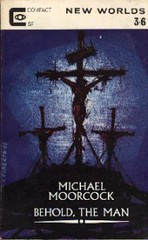 Brian Aldiss "Another Little Boy" © New Worlds, Sep 1966 Best SF Stories of Brian W. Aldiss, 1971 --/ fourth place sf story --/ wonder award Solid SF story with a great Cold War paranoid feel and a wicked sense of humour. An over-populated future Earth has adopted total birth control (all girls are given biological treatment, and only a central computer can "undo it" to allow birth). Some nations has completely disappeared from the face of the Earth. Blocks of super-powers threaten each other with mighty (and henceforth absurd) bombs. All this is standard SF fare. But here comes the rub: over-populated conditions have de-sensitized humans to the point that... on the centennial of the Hiroshima bombing, the population wants to be entertained, so they make the ultimate fireworks by dropping another "vintage" atomic bomb from a "vintage" heavy bomber. And then a second one (for an encore!) on Nagasaki. A biting tale, characteristically wild for "New Worlds" of that period. review: 11-Sep-06 (read in 2001) ---------------------------------------------- 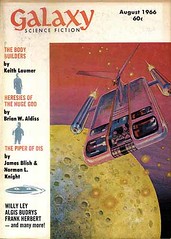 Brian Aldiss "Heresies Of The Huge God" © Galaxy, Aug 1966 Moment of Eclipse, 1970 --/ cool sf story --/ idea award The title is certainly worthy of the Sixties era... and the story is quite unusual in SF. Here is the summary I found on the web: "Really large alien craft or a being --we're talking continent-sized--lands on Earth. Massive seismic and climactic changes ensue. The ship just sits there--no one comes out, there's no attempt at communication, and so on. Every now and then it takes some arbitrary action such as moving a little or extending some new piece of itself. But that's about it. Decades go by. Humanity has to cope with the presence of this strange invader. Religious orders arise to explain it in spiritual terms. Eventually, the ship just leaves, still with no explanation or communication. The departure of the ship once more throws the world into climactic upheaval and threatens to end all life on Earth. The tale is written by a monk of some sort just after the ship has left, and relates all that has happened to date in almost allegorical terms." review: 21-Jul-06 (read in 1995) ---------------------------------------------- 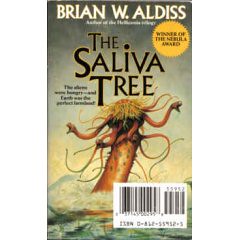 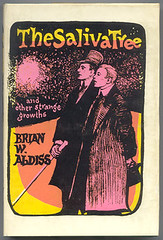 Brian Aldiss "The Saliva Tree & Other Strange Growths" (coll) © Faber & Faber, 1966 --/ fourth place sf collection --/ wonder award --/ style award Of course the lead novella is absolutely gorgeous. Other stories round up the collection, but do not approach it in quality. This collection is worth seeking out for that Lovecraftian-Wellsian "spaced-out" gem that "The Saliva Tree" novella is (a detailed review is forthcoming). If Aldiss have written nothing else but this novella, he'd secure his place in the genre. Respect. review: 10-Jul-06 (read in 2006) ---------------------------------------------- 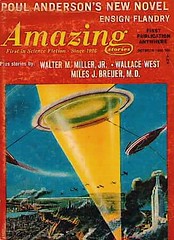 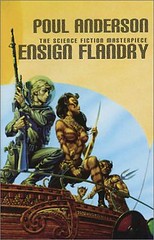 Poul Anderson "Ensign Flandry" (nv) (Dominic Flandry series) © Amazing, Oct 1966 book: Berkley, 1966 --/ fourth place space sf novel --/ wonder award --/ adventure award --/ awesome scale This is one of the better Flandry novels, setting the stage not only for the series but for the endless imitations and the whole sub-genre of "naive space cadets coming of age among gritty interstellar war". Most of diplomacy and "cloak-and-dagger" plot is well thought-through and will be appreciated by those who like their Cold War-style politics suitably sophisticated and cold. For me the biggest "bang" came when Anderson unleashed the climactic space battles: told from the point of view of being inside the embattled ship, it has loads of Industrial Light & Magic special effects. Enjoyable book, one of the better efforts among "diplomatic space warfare" novels, so popular in the 60s and 70s. It's also a part of the Polesotechnic League future history; the next story in continuity of the cycle is "A Circus of Hells". Check out another enthusiastic review of this book at SF Reviews. review by Avi Abrams: 02-Sep-07 (read in 2003) 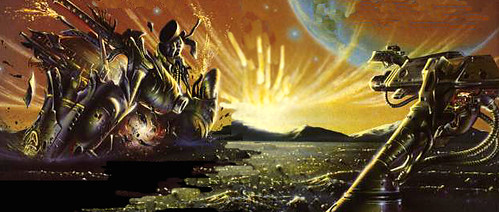 (original unknown) ---------------------------------------------- 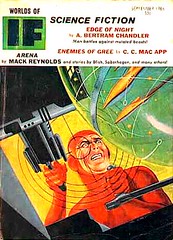 Piers Anthony "The Ghost Galaxies" (basis for the novel "Ghost") © 1966, IF --/ cool sf story --/ wonder award --/ idea award Piers Anthony was a lot more fun in the Sixties, even coming up with cool ideas from time to time. You can not have a wilder idea than this one: Galaxy-sized ghosts terrorize immense reaches of space. Anthony does not elaborate on how these ghosts came to be, but they are sufficiently ghostly and sufficiently... big. review: 12-Sep-06 (read in 2001) ----------------------------------------------  Isaac Asimov "Fantastic Voyage" (nv) (with Jerome Bixby) © 1966, Doubleday Books --/ second place sf novel --/ wonder award --/ adventure award --/ idea award Review by Sunday Williams Like many people I erroneously believed that the movie “Fantastic Voyage” had been optioned from Asimov’s novella of the same name, a fact that would later nag me when I felt the story’s style was, well, not right. Or rather, not exactly Asimov. Originally conceived by Jerome Bixby and Otto Klement, Asimov’s “Fantastic Voyage” was in fact written after the movie went into production, but released before (talk about writing on a deadline!). And while novelization tie-ins have been written as early as the 1920s, it seems to me that “Fantastic Voyage” was amongst the first of its kind for sheer popularity. Technicalities of who-came-up-with-what aside, Asimov’s “Fantastic Voyage” is genuinely charming and engrossing, a page-turner of the highest degree. In it, Asimov’s prose has a rare chance to outshine his story-telling, lending complex imagery to a tale more easily presented in a visual media. It takes a master to turn an over-abundance of adjectives into a truly engaging story, but luckily Asimov knew what he was doing. I find that some novels, like “Fantastic Voyage,” are like hot chocolate on a cold day: familiar, comforting and entirely welcome. Read another review of this novel here. ---------------------------------------------- 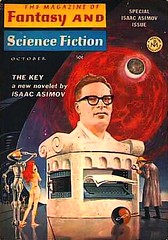 Isaac Asimov "The Key" (Wendell Urth) © F&SF, Oct 1966 Asimov's Mysteries, 1968 "The Key" is one of the best of the Wendell Urth stories, and Asimov really knows how to write competent mysteries. Dr. Urth is the extraterrologist who (just like Isaac Asimov himself) refuses to set his foot on any space transportation device. The stately paced and not very exciting mystery is about finding a hidden alien artifact that gives people psi powers. Not as good as "The Billiard Ball" review: 24-Sep-06 (read in 2002) ----------------------------------------------  J. G. Ballard "Coming of the Unconscious" © New Worlds, Jul 1966 The Overloaded Man, 1967 UK --/ cool article --/ rare find Oh, I loved this article. This discourse on surrealism pulled all the right strings of my heart, made me nostalgic of all the avant-garde museums I visited in Europe, and affirmed my sensibilities of what's cool and crazy in the art sub-genre of "the delusional and obscured". Many thanks to the Good Master. review by Avi Abrams: 10-Jul-06 (read in 2006) ---------------------------------------------- James Blish "How Beautiful With Banners"  © Orbit # 1, 1966 Anywhen, 1970 --/ third place space sf story --/ wonder award --/ style award --/ idea award A total surprise! James Blish writing a sophisticated planetary adventure with all the color, action and ideas worthy of modern practitioners of the genre: Reynolds, Stephen Baxter, Swanwick's "Slow Life"... trust me, it's in the same category! As such, it is an incredible find, partly because Blish did not approach such classic planetary exploration themes again, to the best of my knowledge - and he can really write when he wants to. "Surface Tension" went to number one on my list, even though I read it in translation; now I can really appreciate his style: poetic allusions and hard science blended to one wild idea. A "living" space-suit made from an artificially engineered virus (!) nicely shields a visitor to Titan from its frozen environment - until rather serious trouble occurs when one of the local life forms decides to mate with it... A gem of a story, you can read it online here review: 18-Jul-06 (read in 1986) 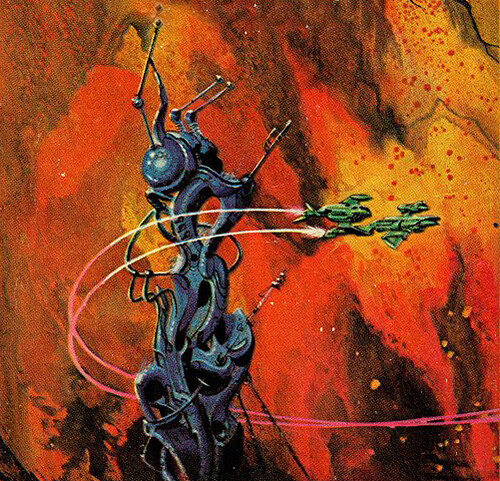 ---------------------------------------------- 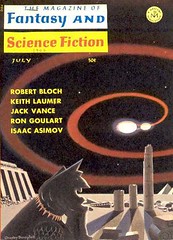 Robert Bloch "The Plot Is the Thing" © F&SF, Jul 1966 The Living Demons, 1967 --short story: 1966 Nebula Robert Bloch already wrote about the psychedelic music-business scene (see "Groovyland"), and now he tackles the Hollywood scene. That's gotta be one ripe ground for "celluloid people" nightmare story. This one, however, failed to give me the lasting impression. review: 10-Jul-06 (read in 2006) ---------------------------------------------- 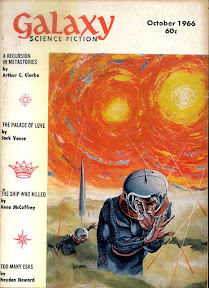 Arthur C. Clarke "A Recursion in Metastories" (also as "The Longest SF Story Ever Told") © Galaxy, Oct 1966 --/ cool sf story Short-short about recursion in fiction. Great idea. It's a pity that spammers already applied it to some blogs. They take one post and unleash their robots, which make it curl up on itself, endlessly re-iterate and never die. Endless (Nigerian) recursion seems to end up in my email account, too. ---------------------------------------------- 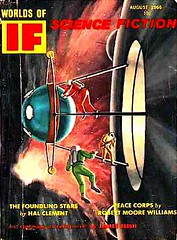 Hal Clement "The Foundling Stars" © IF, Aug 1966 Small Changes, 1969 --/ cool sf novella Average quality hard-nosed "too much science" fiction, which I immediately forgot. It's a pity Hal Clement could not maintain the clarity and sheer thrill of his output in the fifties, when he created unique planetary environments routinely for breakfast, lunch and dinner. review: 21-Jul-06 (read in 2002) ----------------------------------------------  Jon DeCles "The Picture Window" © F&SF, Oct 1966 --/ cool sf story --/ idea award Very quaint & stylish story - true connoisseurs of art will have experienced the power that an extraordinary painting can hold over the sense of space and time; it's possible to spend hours in Hermitage, taken captive by only a few old Dutch masters' landscapes... Typical high-class F&SF story. review: 30-Jan-08 (read in 1988) ---------------------------------------------- 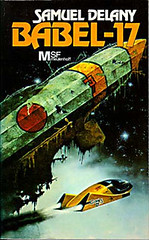 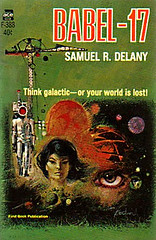 Samuel R. Delany "Babel-17" (nv) © 1966, Ace Books --novel : 1967 Hugo --novel : 1967 Nebula W (tie) --all time novel : 1975 Locus /36 (tie) --Tiptree short list : 1996 Tiptree --/ cool sf novel --/ wonder award --/ idea award: linguistic weapons Quite colorful adventure from Delany based on a cool idea (reading it was like enjoying a sweet "pulp story" candy-coating only to discover a hard, unyieding filling inside - what's more, the bitter filling of disputed and - last I heard - discredited linguistics theory). The theory in question is Sapir-Whorf hypothesis (read a good article about it here ) postulating that the language we speak determines our whole psychological and mental layout, and certain thoughts just would not be able to occur to us in certain languages. The novel is centered on a fictional language that denies its speakers independent thought, forcing them to think purely logical thoughts. Such "linguistic weapon" is used in a space war to produce perfect "servants of empire", walking computer programs. Speaking of novel's style, I enjoyed the ground-breaking presentation, but found it a bit emotionally uninvolving, and ultimately (if not for idea) forgettable. review: 11-Jul-06 (read in 1988) ---------------------------------------------- 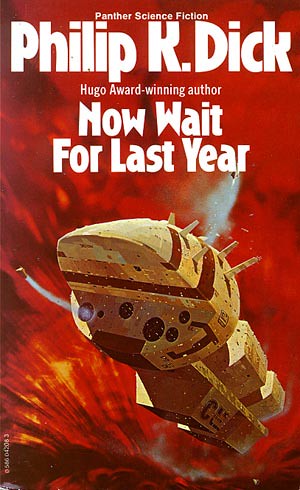 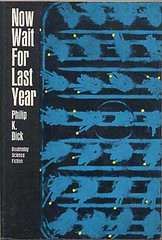 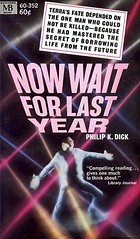 Philip K. Dick "Now Wait For Last Year" (nv) © 1966, Doubleday Books --/ third place sf novel --/ wonder award --/ idea award "When his wife takes a strange new narcotic and then maliciously slips some into his drink, the main character finds himself slipping back and forth through time. Against the backdrop of a pointless war being waged between planets, the main character - while unable to control his place in time - tries to maintain the balance of power by keeping Earth's eccentric and ailing leader in good health... (remember Brezhnev?) Plus there is the disturbing relationship between the submissive main character and his destructive, manipulative wife" (wikipedia). But wait, there is more: - Collecting rare artifacts from 1935 to furnish some tycoon's Mars-based recreation of his Washington childhood. - A number of live copies of certain Government Leader - any, or none of which could be the real one. - Small starship-controlling devices/creatures (mechanical hamsters?) manufactured by a large corporation become the centerpiece of an employee's secret obsession - to give them a kind of intelligence and send them scuttling off around the plant on tiny metal carts. - A sort of "creation/ liberation" kick. Well, never mind - there are twelve different layers to this novel ("Nothing what you know is true") - in Dick's typical paranoid fashion. At the end of the book, the multiple past-lines and clones of main personalities will spiral out of control in a barely cohesive plot, but then even the plot itself, like a crazed centipede, will trip over its hallucinogenic legs, curl up in despair and die, unable to resolve the complexities of its existence. review: 21-Jul-06 (read in 1987) ---------------------------------------------- 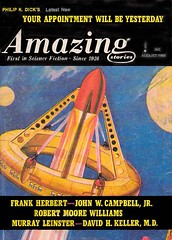 Philip K. Dick "Your Appointment Will Be Yesterday" (exp. into "Counter-Clock World") © Amazing Stories, Aug 1966 The Little Black Box, 1987 --/ third place time sf novella --/ wonder award --/ idea award --/ adventure award "The story to end all stories" - for the simple reason that it's based on the idea of time running backwards, therefore people doing everything backwards, including reading from finish to start. I can think of so many inherent problems and reasons that this can not work, in principle, but in Dick's story it does - with very entertaining effects. Mind you, Dick is even able to turn birth/death backwards (remember "UBIK", where his characters are stranded in time running backwards (deteriorating) after they died - in a death realm) Nothing I could mention here would approach the wild premise and intensity of its realization in this story, so go read it. review: 21-Jul-06 (read in 1995) ---------------------------------------------- 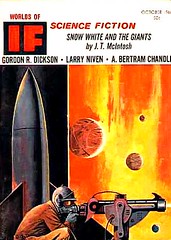 Gordon R. Dickson "In The Bone" © IF, Oct 1966 Ancient, My Enemy, 1974 --/ cool sf story As you can see, Gordon R. Dickson does not rate very high in my books, except for one awesome masterpiece: "Time Storm", which has enough scale and drama for a dozen of "Dune"-like novels. Otherwise, his stories are often witty and competent, but remain very standard fare, easily forgotten. This story is not bad, actually: "a supposedly civilized and sophisticated man is easily defeated in a space battle by a technologically superior alien, but later defeats the alien through brute force and ferocity in hand to hand combat." (Peter Meilinger) ---------------------------------------------- 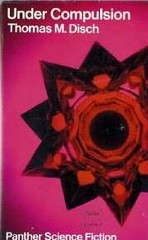 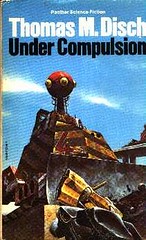 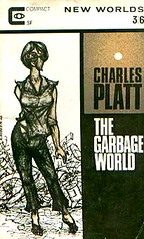 Thomas M. Disch "The Squirrel Cage" © New Worlds, Oct 1966 Under Compulsion, 1968 --foreign short story : 1970 Seiun W --/ fourth place f story --/ idea award --/ style award That story is so full of neat technical tricks and swell ideas that it feels more like a Japanese crazed robotics-produced steampunk-enhanced Victorian Faberge egg. OK, so maybe it's a bit less colorful, but once you read it, you'll see why it's just as memorable as these utterly unique Faberge creations. If you ever felt like you were in the proverbial "squirrel cage" of life, caught in a daily grind, this story will deeply affect your heart. You will become a better man, liberated, freshly-ground with an exhilarating smell, just like the Maxwell House coffee. You will have that extra spring in your step and a satisfied grin: "Oh my, that was quite a story I just read... almost as good as (fill the blank with whatever your kick is)". So, this is what the story is about: The writer sits at the keyboard and types away words... that he himself does not understand, unable to read, and not even sure if the machine registers what he types. His body is a slave to "tyranny of routine". His mind though is liberated in a very special, hilarious way, as he invents a zoo of characters specifically designed to combat futility. Who is this master which keeps the free-wheeling spirit in a squirrel cage? Could it be the same impersonal arrangement that Disch described in "Descending" (another awesomely morbid atmospheric piece), where a hero is caught in a succession of endless escalators - treadmill that extends so far that becomes the world itself? Only a poet could envision fiction like this. But let one other fantasy critic speak. Connor Cochran (of Peter S. Beagle's Fund) thought that "this little story is... phenomenal stuff. Kafka, Beckett, or Duchamp — all of whom "The Squirrel Cage" owes a debt... Serious existential brain-bending. So I was all charged up for something modern, bright, and shiny, something that would put chrome on my eyeballs and neon in my hair." Yeah, and for me it just neatly took me out of the "squirrel cage", if only for a couple of days. review by Avi Abrams: 01-Sep-07 (read in 1999) ---------------------------------------------- 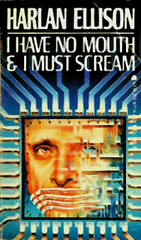 Harlan Ellison "Delusion for a Dragon Slayer" © Knight, Sep 1966 I Have No Mouth, and I Must Scream, 1967 --short story : 1967 Hugo --/ fourth place f story --/ wonder award --/ style award A simple guy dreams incessantly of being a swashbuckling sea captain and saving a lovely damsel. Suddenly he is transformed into such a hero and then ineptly proceeds to crash all possible expectations, disgracing himself in front of said damsel. An obvious moral is to be worthy of one's dreams. Here is what one reviewer has to say: "Mr. Ellison is proud of this one, and justifiably so. In what he calls an experimental style, he strives for mysticism through the Baroque and rococo. I'm afraid I can't comment on that. I can say that his attempt at density of image and layering of narrative succeed splendidly, coming fast and furious, and rarely giving the reader more than a moment to catch his or her breath." So much imagery, that I swallowed it whole (downbeat message notwithstanding) and liked it just for the cool fantasy quest content (it was even made into a Marvel comics later). "A neat, passionate parable, exploring what might happen if one were granted the opportunity to walk the walk after talking the talk." review: 11-Sep-06 (read in 2001) ---------------------------------------------- 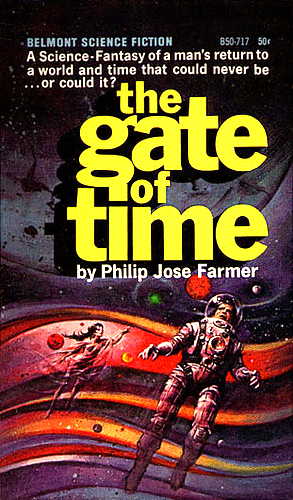 Philip Jose Farmer "The Gate Of Time" (nv) (also as "Two Hawks From Earth") © 1966, Belmont Books Two Hawks From Earth, 1979 An alternative timeline novel. A pilot shot over Romania, discovers that the world in which he landed.. does not have America. The ancestors of the various Native American tribes did not cross the non-existent Bering Strait but wandered westward into Europe, taking place of Slavs. Hmm... makes for an interesting history. The novel is very fast-paced in action but did not leave a lasting impression. review: 10-Jul-06 (read in 2004) ---------------------------------------------- 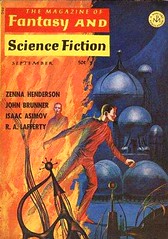 R. A. Lafferty "Narrow Valley" © F&SF, Sep 1966 900 Grandmothers, 1970 --short story : 1999 Locus All-Time Poll /40 --/ cool sf story --/ idea award --/ humour award Here is the typical "Lafferty-yarn": perfectly skewed piece of nonsense, wrapped in a dead serious narrative with a brilliant idea in the center and an eye for cracked grandiosity. In this story he investigates a very peculiar geological phenomenon, mixing it with the dream-logic of typical tall tales. Check out this quote: "It is a continental fault coinciding with a noospheric fault," said the scientist. "The valley really is half a mile wide, and at the same time it really is only five feet wide. If we measured correctly, we would get these dual measurements. Of course it is meteorological! Everything including dreams is meteorological.... There is a clear parallel in the Luftspeigel sector in the Black Forest of Germany which exists, or does not exst, according tho the circumstances and to the attitude of the beholder. Then we have the case of Mad Mountain in Morgan County, Tennessee, which isn't there all the time, and also the Little Lobo Mirage south of Prisidio, Texas, from which twenty thousand barrels of water were pumped in one two-and-a-half year period before the mirage reverted to mirage status. I'm glad I was able to give a scientific explanation to this or it would have worried me." Some call Lafferty a genius, some dissmiss him as too oblique. As one reviewer says: "That problem is exacerbated by the fact that under superficial consideration he looks easy... readers and critics should make some effort to look beneath the hood to see what was what, otherwise his complexities--of both language and meaning--end up dismissed as just nonsensically bad ordinary writing. As a thirsty drinker expecting the taste of a soda pop might well spit out in disgust a mouthful of vintage brut champagne, so might an SF reader expecting typical SF reject vintage Lafferty." review: 12-Sep-06 (read in 2001) ---------------------------------------------- 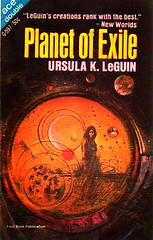 Ursula K. Le Guin "Planet Of Exile" (nv) (Hainish Series) © 1966, Ace Books --/ cool sf novel --/ style award Planet of the harsh conditions as a background to the softly-told love story. This novel has charm, even though it is definitely a lesser work. Le Guin's prose in the sixties possessed this warm glow, and sort of fragile beauty that would disintegrate on a critic's close examination of the plot, etc. I would not do it, just hold a nice memory. review: 11-Jul-06 (read in 1989) ---------------------------------------------- Richard McKenna "The Secret Place"  © Orbit # 1, 1966 Casey Agonistes, 1973 --short story : 1967 Hugo --short story : 1967 Nebula W --/ cool sf story --/ style award "A sensitive piece of writing, a perfect example of second generation science fiction, the retelling and reexamination of a theme that originated in the pulp years..." It left me cold, though. Geology, alternate pasts, some good emotion there, but it just did not click. review: 21-Jul-06 (read in 1988) ---------------------------------------------- Mostly known for his "Ringworld" series of novels and a tireless world-building, Larry Niven has a penchant for cool-looking aliens, cool-looking planetary landscapes and cool-looking spaceships. In fact his whole body of fiction is so cool-looking that I am surprised that none of his adventures have made it to the big screen yet. Visuals and a solid science grounding are always supplemented with a lively plot and constant flow of ideas. One of the best "hard science fiction" writers of the 70s-80s school, if not THE best.  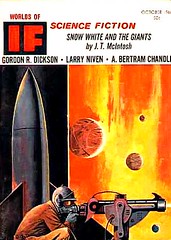
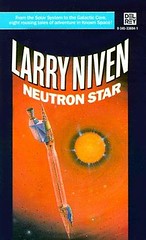 Larry Niven "Neutron Star" (Beowulf Shaeffer series) © IF, Oct 1966 Neutron Star, 1968 --short story : 1967 Hugo W --novelette : 1999 Locus All-Time Poll /30 (tie) --/ third place space sf story --/ wonder award --/ adventure award --/ idea award Talking about an offer you can't refuse... Beowulf Shaeffer, who is a bit of a space tourist, a bit of an adventurous Han Solo-type, is pressured by aliens to get inside the perihelion of a neutron star and live to tell the tale (never mind the huge tidal forces that would stretch your body into one infinite spaghetti). To the best of my knowledge this is the only story that describes in a scientifically plausible way what happens to a ship inside a neutron star's Schwarzschild radius. Alastair Reynolds attempted to describe what happens on the surface of an inconceivably dense neutron star, but his vision was rather more surrealistic and contrived. "Neutron Star" sticks to hard science, justly winning many top awards. Clearly a "thought-experiment" kind of story, it competes with the best of Hal Clement, Robert L. Forward and even Stanislaw Lem (who put his Pilot Pirx through relativistic loops once with incredibly inventive results). And if you are skeptical about chances of Beowulf Shaeffer coming out alive after being turned into a cosmological spaghetti, read the story to find out how he spooled himself back together again. review by Avi Abrams: 04-Sep-07 (read in 1988) "Neutron Star" (coll) © 1968, Ballantine Books --/ second place space sf collection --/ wonder award --/ adventure award --/ idea award --/ awesome scale SIMPLY THE BEST COLLECTION OF HARD SCIENCE FICTION SPACE STORIES I HAVE READ. Miles above the competition, "Tales of Known Space" and "Flatlander" series are even more entertaining in a collection, where each story adds to a kaleidoscope of splendid space outings. This is your best bet for getting a taste of what Larry Niven is all about. When published in sf magazines in the late 60s, these stories burst like a supernova among the glut of tame & predictable offerings of the time - and I'm sure you'll still get an almost relativistic "kick" out of reading them today. ---------------------------------------------- 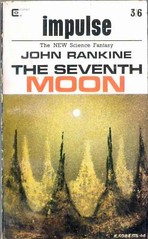 Keith Roberts "The Scarlet Lady" (as by Alistair Bevan) © Impulse, Aug 1966 Winterwood & Other Hauntings, 1989 --/ fourth place f story --/ wonder award --/ style award --/ idea award --/ rare find One of the best fantasies of the "car-come-alive" kind. Recommended for every car nut out there, and also as a rarity - hardly ever known and reprinted, yet very thrilling and of the highest stylistic quality. I did not expect such kind of "Weird Tales" performance from this usually subdued writer. review: 21-Jul-06 (read in 2002) ----------------------------------------------  Fred Saberhagen "The Face of the Deep" (Berserker Series) © 1966, IF Berserker, 1967 The Berserker Wars, 1981 --/ fourth place space sf story --/ wonder award --/ adventure award Great space thriller from the "Berserker" series, which is surprisingly enjoyable pulp-style adventures, written in a hard-boiled, intense manner. Normally I do not read military science fiction, but this series stands well above usual fare. The enemy is impossibly strong and vicious, to the point that human effort seems to be almost irrelevant - so soldiers are forced to rely more on faith and ideas, rather than warfare. Berserkers are almost invincible killing machines spreading across the Galaxy, regarding humans as, well, just a little speck of biological matter. However, all stories end in human victory. Go figure (and pat Saberhagen on the back). Here a soldier wakes up in a transparent escape pod, realizes that he is also trapped in an asteroid field of some sort and that there is a Berserker trapped in this field as well. A tale of survival and a "battle of the brains" follows. Recommended. review: 12-Sep-06 (read in 2001) ---------------------------------------------- 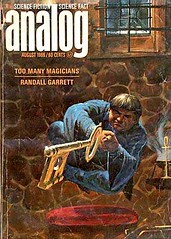 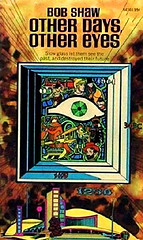 Bob Shaw "Light of Other Days" (exp. into "Other Days, Other Eyes") (Slow Glass) © Analog, Aug 1966 also in - Amazing, May 1972 novel : Ace books, 1972 --short story : 1967 Hugo --short story : 1967 Nebula --short fiction : 1971 Astounding/Analog All-Time Poll /6 --short story : 1999 Locus All-Time Poll /14 --/ cool sf story --/ idea award Slow glass is one of the most original concepts to appear in sf in decades. Light travels through this glass so slowly that, looking through a pane of it, you might see what happened five minutes ago on the other side - or five years. It stopped being a toy. It became invasion of privacy. Many other moral and practical complications arise. review: 21-Jul-06 (read in 1986) ---------------------------------------------- 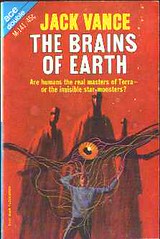 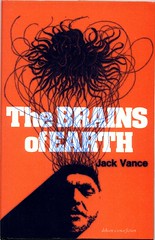 Jack Vance "Brains Of Earth" (nv) (also as "Nopalgarth") (Nopalgarth series) © Ace Double, 1966 also - DAW Books, 1980 --/ fourth place sf novel --/ wonder award --/ idea: para-cosmos --/ shock value This is a small pop-art masterpiece with some psychedelic overtones. It feeds on paranoid ideas of the Fifties (aliens possessing our brains), embellishes it with cool descriptions of psychological and aural warfare (reminds me of "Final Fantasy" ghostly doppelganger entities), and reads like a gaudy poster in its simplicity of idea and plot. I often skipped many pages, to arrive sooner at the bizarre parasitic "brain" warfare sequences, which make this book to stand out from other invasion fare, and from everything else Vance has written. review: 10-Sep-06 (read in 2003) ---------------------------------------------- 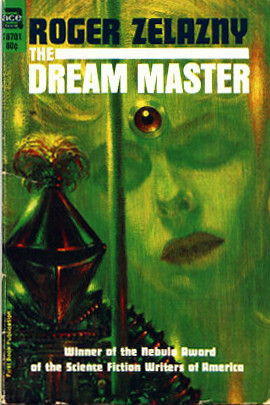 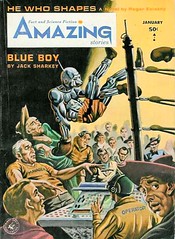 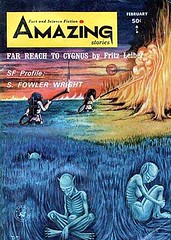 Roger Zelazny "The Dream Master" (nv) (exp. from "He Who Shapes") © Amazing, Jan 1965 book: 1966, Ace Books --novella : 1966 Nebula W (tie) --novella : 1999 Locus All-Time Poll /14 --/ third place sf novel --/ wonder award --/ style award --/ idea award --/ emotion award A very important novel, a triumph for the new imaginative style, one of the most readable examples of the "New Wave" and a great testament to the psychedelic era. The dream-like quality of Zelazny's writing envelopes the reader and satisfies in itself, not much concerned with action, plot, or even with characterization. How can that be, you may ask? Because this novel is one step short of poetry, one bite short of a spaced-out mushroom experience, one chord short of Hendrix' guitar solo - take any number of other authentic sixties art experiences and translate it into writing. But it is not to be analyzed for plot and structure. It's loosely about a psychoanalyst, and a mechanic (Shaper) of dreams. In a warm womb of metal, his patients dream their neuroses, while Render, intricately connected to their brains, dreams with them, makes delicate adjustments, and ultimately explains and heals. Things go wrong in the human mind, and Zelazny plots the doomed rollercoaster of imagery without any point, or destination - "art for the sake of art only". review: 10-Sep-06 (read in 1989) ---------------------------------------------- 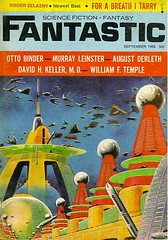 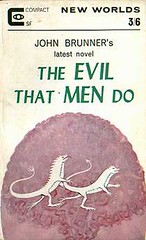 Roger Zelazny "For a Breath I Tarry" © New Worlds, Mar 1966 also in - Fantastic Stories, Sep 1966 The Last Defender of Camelot, 1980 --novelette : 1967 Hugo --short fiction : 1971 Astounding/Analog All-Time Poll /21 (tie) --novelette : 1999 Locus All-Time Poll /11 (tie) --/ fourth place sf story --/ wonder award --/ style award A classic story about artificial intelligence (Machine) becoming, or dreaming to become natural intelligence (Human). This theme was worked and re-worked many times, and by the end of Sixties could’ve become passe, but Zelazny wraps it in his patented word-magic, gives it philosophical (and even theological) depth – pitching the arguments of Job against the temptings of Faust) and ends up with a mature, imaginative story, a veritable masterpiece. A computer with a hobby to become man is perhaps an ultimate delusion. Something created cannot become the creator, no matter how it tries. An interesting analogy here: born again christians (being themselves created) CAN become one with Creator, spiritually speaking. It does not come from ourselves, but given from above. In other words, if a machine wants to become human, it has to break into the spiritual dimension first and ask the utmost authority, clear it with God Himself (as humans are not masters of themselves either, and do not have an authority to create a soul). And somehow we all know which answer such a machine might get. review: 27-Aug-06 (read in 2004) ---------------------------------------------- 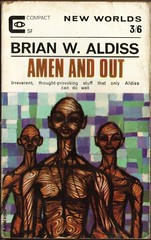 Roger Zelazny "The Keys to December" © New Worlds, Aug 1966 The Doors of His Face, the Lamps of His Mouth, 1971 --novelette : 1968 Nebula --/ fourth place sf story --/ wonder award --/ style award Wonderfully stylish and smoothly told story, with many poetic elements, generating images that stay with reader for a long time. Here is what happens: "some aliens terraforming a planet to make it cold enough for them to inhabit (and simultaneously freezing the monkey-people natives to death)" Roger Zelazny adds emotion to this tragic plot, and you can almost touch the ice of that planet. One of the best planetary ecology descriptions to grace the pages of SF magazine in the Sixties. review: 21-Jul-06 (read in 1987) ---------------------------------------------- Return to the Wonder Timeline Labels: Timeline |
Click to go to "Dark Roasted Blend" site

|
Collecting Pulp Magazines Ephemera Interview with Avi Abrams |

|
Enchanting Victorian Fairy Tale Art "Then world behind and home ahead..." |

|
Exceptional British Scifi Artwork from the 1950s Space Pulp Art by Ron Turner and other British artists |

|
Pulp Pleasures: Eando Binder Great space adventure fiction from the 1930s "Where Eternity Ends" and other rare gems |
Also read recent posts:
Author's Pen Names - Most Complete List Ever
The Wonder Timeline: SF&F Restrospective
Space Adventure Article
|
"SF&F Reading Experience" is part of "Dark Roasted Blend / Thrilling Wonder" family of sites. We try to highlight the most entertaining and rewarding science fiction and fantasy, with emphasis on memorable reader experience, not necessarily general acceptance by the critics. Have fun, and delve into our extensive ratings and reviews! Most reviews are written by Avi Abrams, unless otherwise noted. Reviews also appear on our unique historical retrospective page Wonder Timeline of Science Fiction. Feel free to submit your own review, if a particular story is not listed here. All major OFFICIAL AWARDS are highlighted in BLUE ("winner" has a letter "W" by it, otherwise it is a runner-up only) Our PERSONAL AWARDS (ratings) are highlighted in RED and PURPLE: --/ first place : --/ second place : --/ third place : --/ fourth place : --/ cool : (equal to fifth place) ALL "BEST OF" LISTS ARE LOCATED HERE These awards are given in the following categories: - novel : - series : - novella : - story : - collection : Also, there are our personal STYLE / GENRE SPECIFIC AWARDS. These reflect the story's content and the lasting impression on the reader: --/ wonder award sense-of-wonder, "visual intensity" and inventiveness --/ idea award originality of idea / concept --/ adventure award exhilarating plot, excitement / action --/ style award outstanding literary qualities, inimitable style --/ romance award intense and beautiful love / relationships --/ humour award funny and cool --/ emotion award touching, lasting impression, sensitivity --/ shock value altogether wild --/ awesome scale mind-boggling; further enhances sense-of-wonder --/ rare find very hard to locate, mostly from old pulps, never reprinted, etc. Again, please feel free to leave your own review or comment under every writer's entry; also recommend us other stories you liked. |

0 Comments:
Post a Comment
<< Home